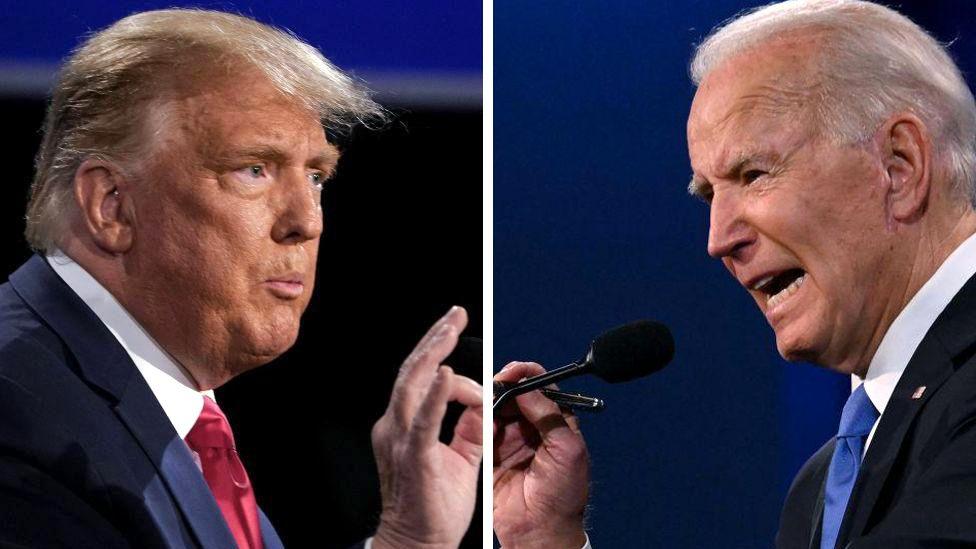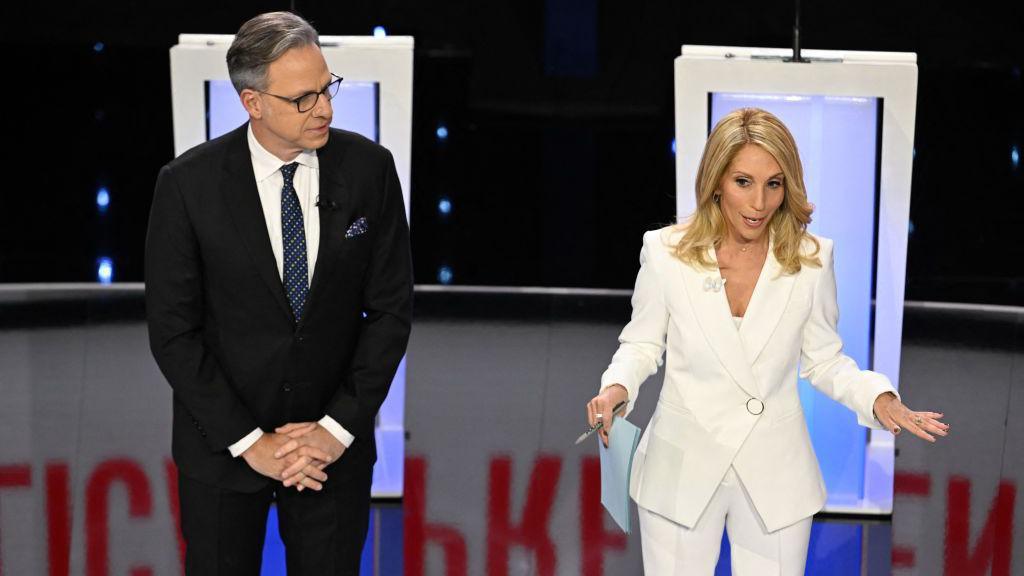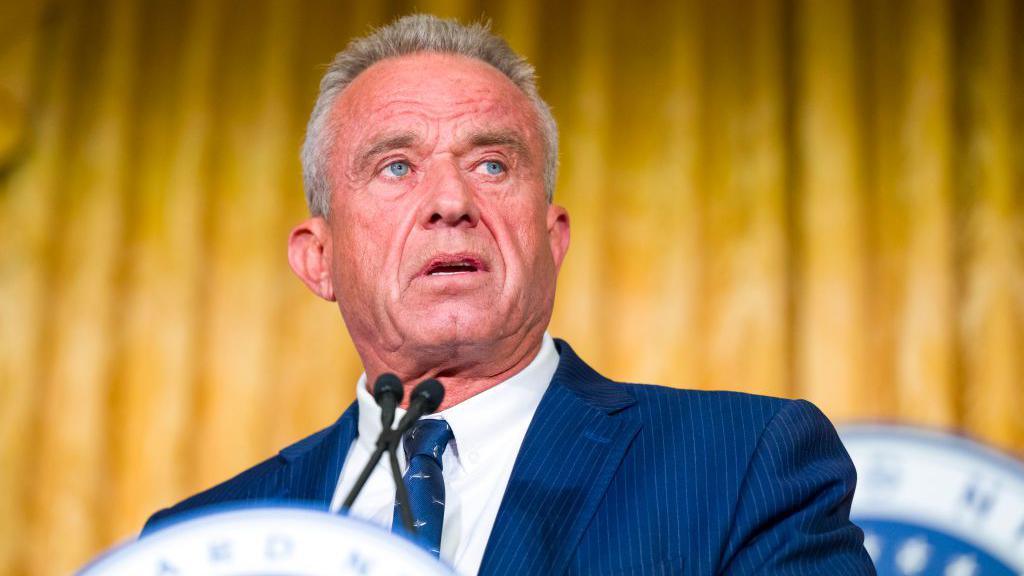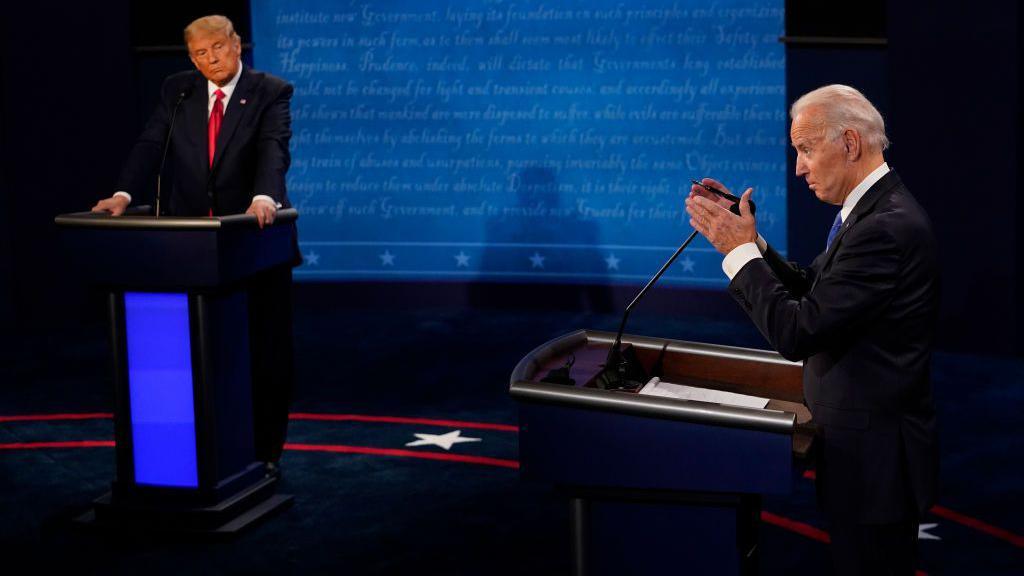What time is the Trump v Biden presidential debate?

Neither man has stepped on a debate stage since their last showdown in 2020
- Published
The US election season is heating up - and the first debate between President Joe Biden and his rival, Donald Trump, is just hours away.
Over the summer, both men will formally become their parties' 2024 candidates.
But on Thursday the Democratic incumbent and his Republican predecessor will lock horns on CNN.
You can watch the CNN Presidential Debate on CNN or simulcast on the BBC News channel, BBC website and app.
It will be the first of at least two debates before the 5 November election.
When and where is the debate?
The debate begins at 21:00 EDT (01:00 GMT) on Thursday 27 June.
It takes place live on CNN from Atlanta, Georgia.
The BBC will have a team of reporters providing analysis, fact checks and reaction from the spin room.
Follow our live blog for coverage in text and video. And you will be able to watch the debate by clicking the play button at the top of that page.
What are the rules?

The moderators are CNN anchors Jake Tapper and Dana Bash
Veteran CNN anchors Jake Tapper and Dana Bash will moderate the debate.
The network says it will last 90 minutes and include two commercial breaks.
The two candidates flipped a coin last week to determine their podium placement and the order of their closing statements.
The Biden campaign picked tails, and the president has elected to appear at the podium on the right hand side of the screen, with Trump to his left.
But the Republican will get the last word at the debate, as he opted for Mr Biden to deliver his closing statement first.
Both candidates will stand for the debate. Reports suggesting that Mr Biden requested a seat for the event are inaccurate, according to his campaign.
Campaign staff are not allowed to interact with either candidate over the course of the event, including during each break.
Each man will be given a pen, a pad of paper and a bottle of water - but no props or pre-written notes are allowed on stage.
Unlike in their previous showdowns, the candidates will have their microphones muted except for when it is their turn to speak.
There will also be no studio audience - and CNN intends to "enforce timing and ensure a civilised discussion".
Isn't it a bit early for a debate?
This is the earliest televised US general election debate since 1960.
It is also the first one since the late 1980s to not be organised by its traditional host, the bipartisan Commission on Presidential Debates (CPD).
To explain why that is the case, let's go back four years.
Joe Biden and Donald Trump faced off against each other on a stage twice before their 2020 contest.
Those two debates were ugly and heated affairs widely panned by viewers.
But for months now, their rematch has looked all but inevitable.
Polling indicates most Americans are not thrilled about that, external - so the 81-year-old incumbent and his 78-year-old rival are keen to build whatever momentum they can with a jaded electorate.
They shadow-boxed for several weeks, suggesting neither man wanted to debate the other.
Then, in May, Mr Biden threw down the gauntlet.
Allow X content?
This article contains content provided by X. We ask for your permission before anything is loaded, as they may be using cookies and other technologies. You may want to read X’s cookie policy, external and privacy policy, external before accepting. To view this content choose ‘accept and continue’.
At the same time, the Biden campaign issued a series of complaints over how the CPD had handled the 2020 debates, criticising it for an antiquated approach for creating "huge spectacles" rather than "good debates".
It also argued that the CPD-hosted debates take place too late in the cycle, when people in some states have already cast early ballots.
Within hours of the challenge, Trump agreed to two debates - the CNN event next week, and a second meeting in September on ABC News.
These events will be based largely on ground rules laid out by the Biden campaign.
The Trump campaign has called for more debates, with audiences, but his rival has so far turned down the proposal.
Thursday night will be the first time either steps on a debate stage in four years.
Black voters pushed Biden to 2020 Georgia win, but support is waning
- Published26 June 2024
What about RFK Jr?

Robert F Kennedy Jr failed to qualify - and he's blaming Mr Biden and Trump for it
The window to qualify for this debate closed late last week.
CNN says only Mr Biden and Trump satisfied all of its requirements.
To qualify, participants had to:
Meet the constitutional requirements to serve as president;
File a formal statement of candidacy with the Federal Election Commission;
Receive at least 15% in four national polls that meet the network's standards; and,
Appear on enough state ballots to meet the threshold of 270 electoral votes needed to win the presidency.
According to CNN, independent presidential candidate Robert F Kennedy Jr did not meet the latter two requirements. The network said he only had three qualifying polls and, because he currently appears on just six state ballots, can only accumulate 89 electoral votes.
Mr Kennedy - who has accused the Biden and Trump campaigns of "colluding" with CNN to exclude him - slammed the decision as "undemocratic, un-American, and cowardly”.
His campaign has loomed large over this race, threatening to pull a sizable portion of the vote from two unpopular major-party candidates.
Other candidates also did not make the cut for CNN's debate.
RFK Jr fails to make CNN debate as fundraising slows
- Published20 June 2024
The US presidential race is not just Biden v Trump
- Published24 August 2024
How are Biden and Trump preparing for the debate?
Mr Biden spent the days before the debate huddling with some of his closest advisers at Camp David, the rustic presidential retreat in the quiet mountains of Maryland.
In prep sessions, the Democrat reportedly pored over question-and-answer binders in an effort to frame the election as a choice between two opposites.
Ahead of the event, campaign officials stressed he will continue his new "punchier" approach toward his Republican rival.
He prepared with Ron Klain, his former chief of staff, who also helped him get ready for his State of the Union speech in March.
The BBC’s US partner CBS News reported that Bob Bauer, who served as White House counsel under former President Barack Obama, played the role of Trump in the mock debates with Mr Biden.
The Biden campaign co-chair also hinted that one of the strategies will be to attack the Republican rival on his legal troubles and character.

By contrast, Trump participated in a series of "informal policy discussions", according to his campaign.
In these sessions, he huddled with lawmakers - including at least two vice-presidential contenders, Marco Rubio and JD Vance - as well as policy experts, senior advisors and outside allies on a range of topics from abortion to crime.
On Saturday, the former president held a rally in Philadelphia, where he asked the crowd if he should be “tough and nasty” towards his rival during the debate, or “be nice and calm”.
Trump initially set the bar very low for his opponent, claiming he is "the WORST debater I have ever faced" and "can't put two sentences together".
More recently, however, he has said he doesn't want to “underestimate” Mr Biden.
The president's campaign officials said earlier this week that Mr Biden has decades of successful debate experience, as well as a strong team to help him prepare.
Trump has also suggested the odds will be stacked against him, in part because he says he will be unfairly treated by the media.
Jason Miller, a key Trump strategist, claimed CNN could act as a pro-Biden "participant" in the debate, rather than a neutral "facilitator".